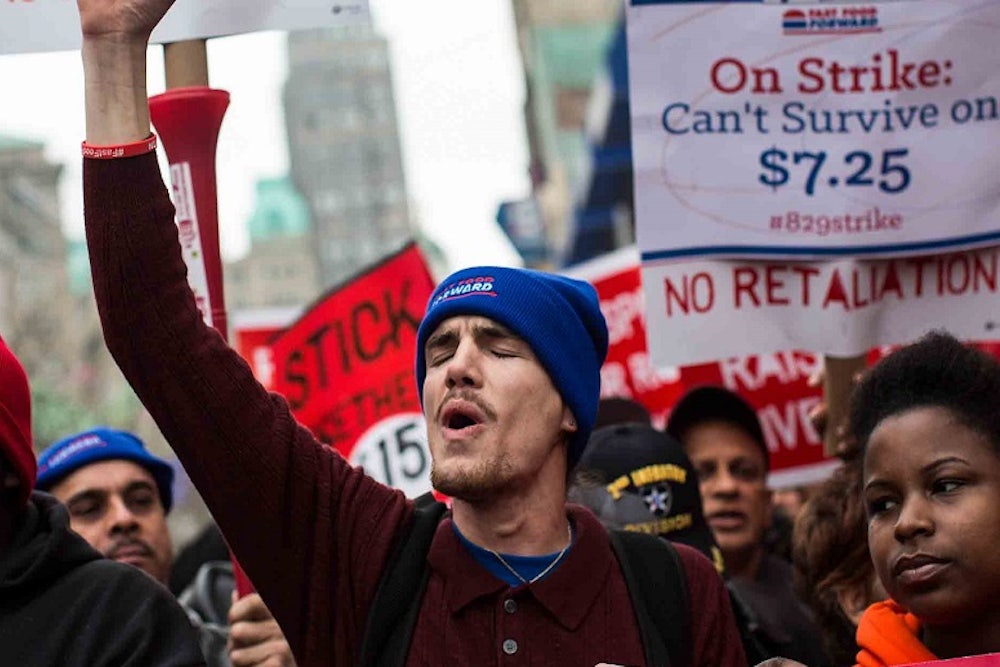It’s very rare these days to hear any good news about wages of low-income Americans. But Elise Gould, of the Economic Policy Institute, delivered exactly that in a report at the end of August.
Between the first half of 2013 and the first half of 2014, Gould found, the real wages of the bottom 10 percent of Americans grew 0.3 percent. That’s not much—in fact, it’s just a 2 cent increase in hourly pay—but every other decile saw their real wages fall during that period. That may be surprising. After all, the poorest workers generally see their wages stagnate, not rise. But there’s a good reason for why that trend reversed itself and it has to do with the minimum wage. Not the national minimum wage. Due to Republican obstruction, it remains stuck at $7.25. In the meantime, states have raised their own minimum wages—and that has made a difference for the poorest workers.
In 2014, 13 states raised their minimum wages, five through legislation and eight through inflation indexing. Gould compared wage growth for the bottom 10 percent of Americans in those 13 states with the rest of America. In the former, real wages grew 0.9 percent, a non-negligible increase. In the remaining 37 states, real wages declined 0.1 percent. In other words, wage growth for the bottom 10 percent of Americans is entirely attributable to states that increased their minimum wages.

That’s good news, but it’s not unexpected. Conservatives largely concede that raising the minimum wage increases wages. They oppose it, they say, because it will reduce job growth. So, did that happen in those 13 states? Jared Bernstein, the former chief economist for Vice President Joe Biden and a senior fellow at the Center for Budget and Policy Priorities, looked at the data. He found that job growth was higher in states that raised their minimum wages than it was in those that didn’t (1.8 percent versus 1.5 percent).

Bernstein is quick to point out the limitations of this data. “Now, these are all small changes and I wouldn’t make a federal case out of any of them,” he writes. But it’s also important to note that minimum wage hikes have not crippled job growth in those 13 states. When the Senate next votes on raising the national minimum wage—possibly in the next few weeks—that’s something Republicans should keep in mind.
—Danny Vinik
News from the weekend:
ADRIAN PETERSON: The NFL running back has been charged with injuring his son, for whipping him with a stick severely enough to cause multiple injuries. But don’t expect a conviction, because “in much of the United States, beating your own children—even to the point of bodily harm—is perfectly legal.” (Mark Joseph Stern, Slate)
VOTING RIGHTS: A three-judge panel has reinstated Wisconsin’s Voter ID law, which a lower federal judge had declared unconstitutional. The ruling, which came just hours after oral arguments, could give incumbent Scott Walker an advantage in his tough reelection bid. All three of the judges were Republican appointees. (Ian Millhiser, ThinkProgress)
OBAMACARE: An error in an online tool set up by the federal government allows employers to avoid complying with requirements that they provide employees with decent health insurance. It’s a true Obamacare “glitch,” although it’s not clear how many companies are exploiting it. (Jay Hancock, Kaiser Health News)
ECONOMY: Max Ehrenfreund reports on a new paper from economists at the Federal Reserve that finds that most of the workers who dropped out of the labor force in the last few years are not coming back. That has big implications for monetary policy. (Washington Post)
Stories worth reading:
The best interventions are the early ones: Nicholas Kristof and Sheryl WuDunn review the best available science on brain development—and make the case for programs, such as the Nurse-Family Partnership, that attempt to help at-risk children by reaching them when they are very young. (New York Times)
U.S., take note: Electric utilities once dismissed clean energy as a substantial power source in Germany. Now, Germany's rapid leap made in renewables could disrupt the entire market. (Justin Gillis, New York Times)
Unlikely allies: At the same time Obama rolled out historic carbon cuts, his administration has helped the coal industry, especially in western U.S., advance. (Michael Kranish, Boston Globe)
Sub-prime mortgage rebound? Binyamin Appelbaum reports on how low-income Americans are struggling to find banks that will offer them a mortgage. Maybe, he wonders, we could use more sub-prime loans. (New York Times Magazine)
Fighting homelessness: A bipartisan consensus around the best strategy to combat homelessness is quickly forming: Give them homes. Utah, not exactly a bastion of liberalism, cut the numer of chronically homeless people in the state by 74 percent by doing just that. (James Surowiecki, New Yorker)
Stories we’re watching:
Any further action from the NFL over Ray Rice’s domestic violence incident and the indictment of Minnesota Vikings running back Adrian Peterson for child abuse. And the House and Senate must both decide whether to include Obama's request to authorize military aid to the Syrian rebels in the continuing resolution or to hold a separate vote.
At QED:
Jonathan Cohn explains five steps we can take to reduce domestic violence. Rebecca Leber highlights a new study that finds that male witnesses vastly outnumber female witnesses at House hearings.
